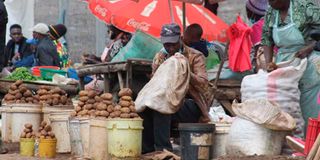Initiate traceability of farm produce to capture global market and avoid losses

Potato traders at Elburgon Open Air Market in Nakuru County in September 2021.
What you need to know:
- If KFC cannot, for proprietary reasons, tell farmers their requirements, how would they engage?
- Does the farmer proceed through trial and error until KFC gives the thumbs-up?
Recently, Kenyans were treated to rather surprising news about US international fast food giant KFC’s local franchise had ran out of chips for customers for lack of Irish potatoes. With potatoes rotting in their farms, Kenyans wondered why anybody would run out of supply.
I was not surprised. International franchises run under stringent industry standards to protect their global brand, maintains quality and keep a happy customer base. One of those standards is traceability.
Writing in the Daily Nation on January 7, John Miriti (“Is KFC mashing Kenyan farmers?”) touched on traceability while Lydiah Njoroge (“Forget the KFC hot potato, our food is good”) asked international franchises to tell us their demands for us to supply them.
I agree with Mr Miriti that, while we demand priority to local products, we must also ensure that minimum standards are met — a position Tom Mshindi (“Fuss about potatoes misses the point, the farmer is alone”—Sunday Nation, January 9) reinforced. But if KFC cannot, for proprietary reasons, tell farmers their requirements, how would they engage? Does the farmer proceed through trial and error until KFC gives the thumbs-up?
Curiously, no cooperative has asked what the farmer in Egypt does right that we can’t. I like Mr Mshindi’s proposal, of a system to aid value addition to bring the potato to the elusive international standard. Cooperatives can lead this process towards achieving traceability. But why does traceability matter for a food producing and exporting cooperative?
Traceability systems
Traceability ensures that produce can be tracked from farm to fork using a unique code, which could be a number, alphanumeric or some other unique design. The pharmaceutical industry has perfected this. For the vaccinated, check your certificate and you will notice the batch number. If there is a problem with a particular batch, we can trace its journey through the supply chain.
Cooperatives should develop a system for agricultural produce to allow interested parties to trace the produce along the value chain. The consumer can catalyse this process by demanding to know the journey food travels to reach the dining table.
Traceability will guarantee the small-holder farmer a place on the international market. The question should not be “why doesn’t franchise ‘X’ source its potatoes locally” but rather “why aren’t local potatoes in demand beyond the border”.
Cooperatives should use their collectives advantage to support farmers to grow the right potato varieties, provide processing capability, including blanching and blast-freezing the French fries, and ensure traceability. We need appropriate legal and policy frameworks to create a conducive environment for traceability systems.
Standard of traceability.
Even without these frameworks, agricultural cooperatives should facilitate the design of standards which allow traceability. They could develop codes consisting of a combination of identifiers like country, product, county, cooperative, farm, week and year.
Thus, a potato farm in Nyansiongo could have a code like 254/P/46/MFCS/80/01-22, where 254 is the country code, P for potato, 46 for Nyamira county, MFCS for Menyenya Farmers’ Cooperative Society, 80 for the farm that produced the potatoes during week one in 2022.
With the help of readily available software this alphanumeric code could be reduced to a machine-readable bar/QR code. Each bag of potatoes should then be tagged for ease of identification. The potatoes can also be blanched and blast-frozen for distribution. Besides attracting multinational franchises and expanding market reach, the farmer would not mourn about rotting potatoes.
By the way, Kenya’s coffee and tea meets the standard of traceability. The European Union is demanding the same for fruits from Makueni County and the farmers are adjusting their practices to meet the standards..
High standard agricultural production and commercialisation can bring the farmer into the global market network through aggregation, value addition and access.
Prof Nyamongo, an anthropologist, is a deputy vice-chancellor at The Cooperative University of Kenya, Fulbright scholar and 2022 Pelto International Award recipient. [email protected]. @Prof_IKNyamongo





